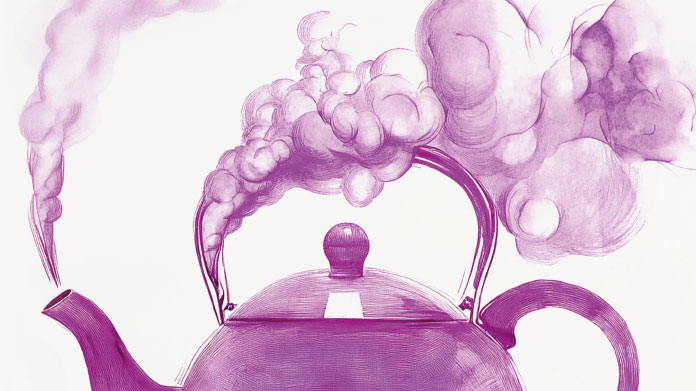Happiness: 7 foods that promote happiness
It’s true – when it comes to happiness, you are what you eat! Discover 7 foods to include in your daily diet if you want to keep on the sunny side of life.

Mushrooms, the feelgood forest food
In omelettes, quiches or sautéd with parsley, mushroomsbring joy to our dishes! A regular ingredient in rustic cooking, mushrooms contain, amongst others, vitamin B8 (biotin) which supports normal psychological function.
For the record, B8 is also found in egg yolk and brewer’s yeast.
Nuts, the snack for beating the blues
What would you say to swapping your afternoon biscuit for a handful of nuts? These oleaginous fruits contain a good range of B vitamins – primarily B1 (thiamine) and B9 (folic acid), but also B3 (niacin) and B6, all of which support psychological stability (1). … They go a long way towards helping you live life to the full!
You can also stock up on B vitamins by taking a comprehensive supplement (such as Coenzymated B Formula, which contains every B group vitamin in a coenzymated form for optimal absorption).
Kiwi fruit, for a brighter breakfast
With its tangy taste and beautiful green (or yellow) colour, kiwi brings a little ray of sunshine to our breakfast bowls. Nutritionally, kiwi is notable for its high content of vitamin C which also plays a role in psychological health (2-3).
Tip: for a little variety, alternate kiwi with citrus fruit or red berries - equally rich in vitamin C. Brightening up your day also means eating a diverse range of foods!
You may wish to further boost your intake of vitamin C (by taking, for example, Triple C, a high-quality supplement that combines 3 synergistic forms of vitamin C: ascorbic acid, calcium ascorbate and ascorbic palmitate).
Parmesan, a ‘good mood’ cheese
For many of us, a comforting bowl of spaghetti bolognese without parmesan is unthinkable. But what you might not know is that this Italian cheese contains high levels of glutamate, an amino acid precursor of gamma-aminobutyric acid(GABA). This key neurotransmitter of the central nervous system plays a crucial role in restoring inner calm, thus promoting a feeling of well-being(4).
That doesn’t mean, however, that you should bury your pasta under a mountain of Parmesan: given its high saturated fat content (20.6 g/100 g), it’s best to restrict yourself to a light sprinkling.
For maximum benefit, you can at the same time, supplement directly with GABA (try PharmaGABA®, a gamma-aminobutyric acid supplement produced naturally from Lactobacillus hilgardii).
Calves’ liver, an unlikely source of happiness
With its unappetising appearance, calves’ liver is more likely to induce a grimace than a smile, yet it should definitely feature on any self-respecting ‘feel-good’ menu. It is actually high in vitamin B12 which supports normal psychological function (5).
It’s worth noting that vitamin B12 is really only found in animal-source foods . If you’re vegetarian, or simply dislike offal, you can increase your intake of B12 by taking a good quality supplement (for example, Methylcobalamine, which offers the most bioavailable form of vitamin B12).
Bananas, the smiley fruit
The French expression “avoir la banane” (“to have the banana”) actually means “to be happy”. Never has a saying been more fitting. If their smile-like shape and soft, sweet flesh weren’t enough, science has confirmed that bananas contain L-tryptophan, an essential amino acid which plays a direct role in the production of serotonin (the ‘happiness hormone’), melatonin (the ‘sleep hormone’), 5-HTP and niacin. Quite a list! (6)
As the body is unable to produce tryptophan, we need to ingest it in order to meet our needs. In addition to dietary measures, innovative supplementsare available that are effective at raising levels (such as L-Tryptophan, a quality-assured tryptophan supplement).
Dark chocolate, happiness in a bar
Do you reach for the chocolate at the first sign of stress? There’s a chemical reason for this. High in tryptophan, dark chocolate – like bananas - induces the release of serotonin(8). It’s also high in magnesium, a mineral good for mental health (9). And let’s be honest, eating chocolate is an intense sensory pleasure!
But try not to devour an entire bar if you want to maintain a reasonable calorie intake: one or two squares a day is enough.
To boost your serotonin levels, you also have the option of taking a cutting-edge supplement (such as the revolutionary formulation Petidea, which contains peptide precursors of numerous transmitters).
References
- Young LM, Pipingas A, White DJ, Gauci S, Scholey A. A Systematic Review and Meta-Analysis of B Vitamin Supplementation on Depressive Symptoms, Anxiety, and Stress: Effects on Healthy and 'At-Risk' Individuals. Nutrients. 2019;11(9):2232. Published 2019 Sep 16. doi:10.3390/nu11092232
- Gariballa S. Poor vitamin C status is associated with increased depression symptoms following acute illness in older people. Int J Vitam Nutr Res. 2014;84(1-2):12-7. doi: 10.1024/0300-9831/a000188. PMID: 25835231.
- Moritz B, Schmitz AE, Rodrigues ALS, Dafre AL, Cunha MP. The role of vitamin C in stress-related disorders. J Nutr Biochem. 2020 Nov;85:108459. doi: 10.1016/j.jnutbio.2020.108459. Epub 2020 Jul 3. PMID: 32745879.
- He Y, Ouyang J, Hu Z, Yang J, Chu Y, Huang S, Yang Y, Liu C. Intervention mechanism of repeated oral GABA administration on anxiety-like behaviors induced by emotional stress in rats. Psychiatry Res. 2019 Jan;271:649-657. doi: 10.1016/j.psychres.2018.12.025. Epub 2018 Dec 5. PMID: 30791338.
- Sangle P, Sandhu O, Aftab Z, Anthony AT, Khan S. Vitamin B12 Supplementation: Preventing Onset and Improving Prognosis of Depression. Cureus. 2020;12(10):e11169. Published 2020 Oct 26. doi:10.7759/cureus.11169
- Jenkins TA, Nguyen JC, Polglaze KE, Bertrand PP. Influence of Tryptophan and Serotonin on Mood and Cognition with a Possible Role of the Gut-Brain Axis. Nutrients. 2016;8(1):56. Published 2016 Jan 20. doi:10.3390/nu8010056
- Paredes SD, Terrón M, Cubero J, Valero V, Barriga C, Reiter RJ, Rodríguez AB. Tryptophan increases nocturnal rest and affects melatonin and serotonin serum levels in old ringdove. Physiol Behav. 2007 Mar 16;90(4):576-82. doi: 10.1016/j.physbeh.2006.11.007. Epub 2007 Jan 11. PMID: 17222434.
- Sachs BD, Ni JR, Caron MG. Brain 5-HT deficiency increases stress vulnerability and impairs antidepressant responses following psychosocial stress. Proc Natl Acad Sci U S A. 2015;112(8):2557-2562. doi:10.1073/pnas.1416866112
- Pickering G, Mazur A, Trousselard M, et al. Magnesium Status and Stress: The Vicious Circle Concept Revisited. Nutrients. 2020;12(12):3672. Published 2020 Nov 28. doi:10.3390/nu12123672
Keywords
5 Days
Delivery is prompt and I never saw a…
Delivery is prompt and I never saw a quality problem with the manufacturing. It is not possible to assess efficacy on a personal basis, since too many factors come into play. Efficacy can only be assessed statistically with a sufficient number of cases.
Roger De Backer
6 Days
I collaborates with the Supersmart…
I collaborates with the Supersmart more than 10 years. Every thing is going good. Quality of the things is good. Delivery comes in time. Five stars definitely !!!
Oleksiy
6 Days
All good
Simple, frictionless site, easy ordering, good delivery updates and execution.
Chris Robbins
8 Days
I feel better
I feel better
Peter Ammann
9 Days
Prompt delivery
Prompt delivery
JAKUB Radisch
10 Days
My new go-to for top quality supplements!
I am buying more and more of my supplements from this superb, high quality company. Cannot recommend it enough. Plus, excellent customer service with a quick, helpful team and speedy deliveries. Highly recommend Supersmart!
Cecilie H.
13 Days
SUPERSMART WHAT ELSE👍
SUPERSMART WHAT ELSE👍
DIEDERLE Christophe
16 Days
Excellent quality products with…
Excellent quality products with innovative formulas, as someone who has been suffering with acid reflux, these supplements have been lifesavers.
Oriana Moniz
16 Days
high quality supplement!
high quality supplement!
GALANT
17 Days
Good service prompt delivery
Good service prompt delivery
Mrs Marcella Reeves
22 Days
I like your clear explanation
I like your clear explanation. And how to make a choice of products for a specific health problem
Ingrid
28 Days
Great product and it arrives quickly.
Great product and it arrives quickly.
SOMMARIVA Gianni
29 Days
Excellent products and fast service.
Excellent products and fast service. What do we need more?
Margarida
33 Days
The variety of products is amazing
The variety of products is amazing, the offers are good and the sending is very fast. I just miss having a bit more of guidance about combinations, possible interactions, etc.
Maria Angeles Verdu
35 Days
It was quick
It was quick.
Timo Antero





